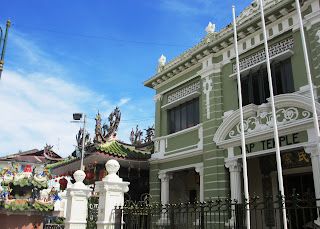We had a late start on our first full day in Penang (R slept until 9:30; thanks baby!). After an enormous breakfast at the truly impressive buffet, we hung around the hotel until R woke up from her nap.
 |
| R and B at brunch |
Then we returned to the center of George Town, where following lunch we took a (self-guided) walking tour. We visited Sun Yat-Sen's revolutionary headquarters (Penang was an important center in the Chinese independence movement), and several clan temples, including the famous Khoo Kongsi.
 |
| Yap Clan Temple |
 |
| Khoo Kongsi: R wants to explore, not pose, and is mad at me for not obeying her: our expressions here are funny |
The clan temples were probably my favorite thing about Penang. In the 19th and early 20th centuries, China was basically in a state of anarchy. For mutual security and support, the Chinese at home and abroad banded together in mutual support societies or clans, sometimes related by blood (people sharing a distant common ancestor), sometimes by place (people from the same city or state). If you had a problem (dishonest business partners, a job loss, death in the family, criminals threatening your life), the society was the one to turn to.
 |
| Altar to the clan ancestors |
Some of the societies were basically gangs (the Green Gang in 1930s Shanghai, for instance), but most were legitimate organizations providing essential social services. For example, since there was no public education, almost all schooling was funded at the clan level.
 |
| Khoo crest |
 |
| The current clan elders |
In Penang, these societies seem to still be an important part of daily life (perhaps because the Malaysian government is fundamentally hostile to the Chinese?). Many advertisements for charities, etc., proudly stated funding came from various clans. The wealthiest of the clans, the Khoo, pays for the higher education of its members. Their very impressive clan temple features several rooms full of placards listing all of the educational attainments of the clan members.
 |
| A few of the placards listing educational accomplishments: there are hundreds |
A testament to the
Chinese respect for education, it seems like it would be a powerful incentive to academically succeed: failure means letting down your entire ancestral line. The Khoos have genealogical records going back over 1000 years, so that's a lot of pressure! As an American (and therefore barely knowing even who my great-grandparents are), it was mind-boggling.
 |
| Display on their genealogical records |

That's really interesting! Haha it's sooo the wrong way to relate to this, but I was just reminded of Mulan and "letting down her ancestors" and how amazing and magical and scary I thought it was as a kid to have that kind of connection to your past.
ReplyDeleteOf course, I definitely wouldn't want 1000 years of family pressure bearing down on me! ;)
Yes, it's a very different attitude. The traditional Chinese think children owe their parents big time, and must spend their lives repaying the debt (basically the opposite of the American attitude: "I didn't ask to be born!!").
DeleteThey even have mandatory parent support (like child support but for your parents) and it's a crime not to pay.
Glad to be back and catch up with your blog again (after a long trip away). It's nice to see more and more pictures of you and little R now ;-)
ReplyDeleteI typed a comment about working French women and it didn't show :(
I love most of your book reviews and I bought a few books according to your words as well.
Welcome back! I hope you had a nice trip!
DeleteI learned how to post pictures (I am apparently a slow learner when it comes to blogging), and decided to just go ahead and post my photo. B still can't be shown though due to his job, explaining the amateurish photo editing on his face.
I am sad your comment didn't come up: the comments are supposed to just show up (no moderation) so I am not sure what happened. :(